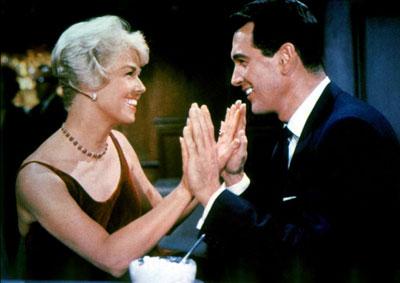Directed by Michael Gordon
Despite Universal’s declining box office returns throughout the 1950s, producer Ross Hunter achieved great success at the studio with handsome and glossy productions, many directed by Douglas Sirk and starring favorite leading man Rock Hudson. Sensing Hudson’s potential as a comic actor, the savvy Hunter seized on the idea of teaming him with Doris Day, America’s favorite girl-next-door, in a sophisticated bedroom farce. By the mid-1950s, Day was free from the “gingham” roles of her Warner Bros. contract, but was suffering from a series of career misfires and a lack of cinematic identity. As Hunter infamously declared in his pitch to Day for what would become Pillow Talk, “Under that dirndl lurked one of the wildest asses in Hollywood!” Day and her co-producing husband, Martin Melcher, were convinced.
Even with Hunter’s confidence, Hudson was nervous about starring in his first comedy. Making matters seemingly worse for Hudson was the fact that director Michael Gordon (helming his first film since being blacklisted in 1951) was a very intense and serious man. Gordon told Hudson to treat the comedy “like the very most tragic story you’ve ever portrayed. If you think you’re funny, nobody else will.” Thankfully the two leads took an instant liking to each other; Hudson credits Day’s incredible comedic instinct and timing for why he became so successful in the genre. The breezy Oscar-winning screenplay also allowed pitch-perfect wisecracking co-stars Tony Randall and Thelma Ritter a chance to display their immense natural comedic talents.
Pillow Talk would garner Day her only Oscar nomination and would become her most identifiable role. Costume designer Jean Louis created a meticulously beautiful wardrobe for Day that instantly transformed the star into a fashion icon throughout the 1960s. Pillow Talk was a colossal critical and box-office success. The film grossed over $18 million and paved the way for two more “Doris & Rock” projects, as well as the slew of Universal sex-comedies to come in the following decade, including Come September (1961), That Touch Of Mink (1962), Man’s Favorite Sport? (1964) and Strange Bedfellows (1965).
—Todd Wiener
Universal-International Pictures. Producer: Ross Hunter, Martin Melcher. Screenwriter: Stanley Shapiro, Maurice Richlin. Cinematographer: Arthur E. Arling. Editor: Milton Carruth. Cast: Rock Hudson, Doris Day, Tony Randall, Thelma Ritter, Nick Adams.
35mm, color, 110 min.






 Mobile Navigation
Mobile Navigation

